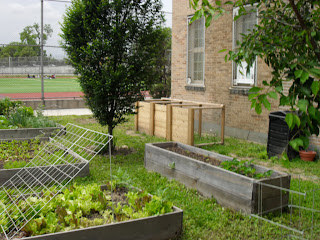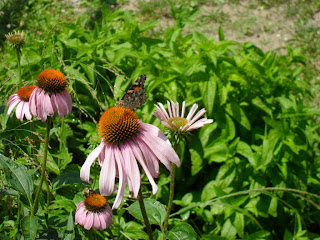by Raymond Pultinas
Building
“The most enjoyable experience would have to be making the
Compost Bin with the EAC (Environmental Affairs Club) simply because we spent
days and hours in a project held deep in our hearts as something we did
together and that no one can take away from us.” - David
Although I had completed the Master Composter Training
Course in the spring of 2011, it wasn’t until February of 2012 that we began
our bin build with Jodie Colon and Junior Shouten of the New York City Compost
Project. Our initial expectations
were that we would be able to complete the project indoors on a single Saturday
in February, but with a meager turnout of students we only completed about
quarter of the build on that day. That left a
series of Thursdays, after school, with a squad of between 10 and 25 students
gathered outside of the garden to saw, measure, plane, drill, hammer and finish
the job. By my estimation, we put almost 24 hours into the building of our
three-bin compost system.
But how
do you measure the sweat and muscle?
Perhaps, it can be measured in the satisfaction connected with the
feeling of ownership that David mentions above. We made it, its ours, and it always will be! But it took so long because it
was thought through, examined over and over again so that it was right. Not only did students learn the proper
use of tools they learned safety above all else: to spot for one another,
carefully stay involved in what is happening, understanding the task every step
of the way.
“Gardens matter, especially in schools because they offer a
place for fresh air and a more natural scene compared to city life. Gardens also open peoples’ eyes to new
life and an alternative to learning (the way we learned in the garden).” - Stacey
“My favorite part was actually planting flowers and
vegetables. I liked getting my
hands dirty.” I loved seeing the
flowers that were there in the beginning of the year. It made me more open-minded about nature and whole foods.” - Fatema
After attending a Seed Starting Workshop hosted by Andrew
Barret of Green Thumb, I felt we were ready to start all of this year’s
vegetable plants from seed. We
studied some short films about germination and then began planting seeds in
plant plugs on trays right in our classroom. We kept our trays of seedlings under the supervision of Mr.
Grosso in our school’s famous tower, then moved them to my own apartment
bedroom during spring break, and finally to the supply shed and, after
acclimating to the temperature and outside conditions, to the garden. Most of our seeds were purchased at our
local Whole Foods Market. I love
to look through packets of seeds, something about that tactile sensation –
sensing the size and number of the seeds inside and its potential growth, but
the red lettuce, basil, arugula and some of the radishes we are growing this
season are from seeds we saved ourselves. We have more growing in our garden than ever
before.



“I felt honored that I got a chance to plant here. I liked going outside to plant because
I had dreamed to work in the garden of DWC.” - Delsaline
Harvesting
“My most enjoyable experience in the garden was learning how
to pick the vegetables and actually seeing what the garden looks like since I
hadn’t noticed it before. Also
eating the lettuce from the garden was very enjoyable.” -
Michael
On May 30, two days prior to the opening celebration that we
had planned we harvested over 15 lbs of lettuce as well as 4 lbs of Radishes
and 1 lb. of Kale, Collards, Scallions, Oregano and Thyme. We cleaned out a bed of red lettuce and
thinned out our mixed greens and offered it to Chef Deb Cahill from Garden to
Café and the staff of the DeWitt Clinton Kitchen including Chef Larry
Crowell. The greens continue to
produce well and we’ve picked and distributed at least that amount in June and
early July. This year we had a
good start with our future harvests of tomatoes, eggplant and peppers and the
corn has begun to look promising.
We’re growing a variety of beans: dry, string, runner. We also have a variety of onions and
garlic, chard, calendula returning, carrots, kale, collards, strawberries (next
year), a few straggling sweet potatoes (experiment) and much more. We also have added additional native
plants to our butterfly garden, courtesy of the Butterfly Project and Bronx
Green-Up workshop, wonderfully conducted by Ursula Chanse and Chrissy Word that I attended in late May.
The western most bed of the garden is in perpetual blossom with an
endless array of native flowers including Swamp Milkweed, Virginia Rose, New
York Ironweed, Arrow Wood and Dogwood, Blue Mistflower and so many others. There is always so much to observe and
learn in our native plant garden.
It attracts butterflies, birds, bees and human beings.
“I love the feeling of the soil between my fingers. I always felt the smell of the
freshness of the flowers that bloomed.
I loved picking veggies and also planting the seeds. I watered the seeds and plants a few
times and I felt they were grateful for it. I think I grew closer to nature and even started to plant
again in my backyard.” - Jessica
Opening
My most enjoyable experience was the garden opening. Seeing people together for the same
cause made me feel that the planning was worth it. The best part was to taste the food provided from the
garden. It was really good and I’m
considering doing it at home.
Everyday I wish I could have it on the side of a dinner meal. That made me realize eating fresh and
healthy is good and for some, part affordable.” - Tyshae
On June 1, we held our opening celebration. We are grateful for the words of our principal, Geraldine
Ambrosio, and our two guest speakers.
Famed community garden activist and Just Foods Trainer Karen Washington
spoke of the how community gardens bring change to neighborhoods. As a member
of the La Familia Verde Garden Coalition, she launched City Farms Market,
bringing garden grown and farm fresh vegetables to her Bronx neighbors.
Herold Hochberger ’72, founder of the Mrs. Green’s
Natural Food Markets spoke about the value of green markets including
vegetables and recommended kickstarter as a means of generating support for green
businesses. Diamond Anderson ’12
did a wonderful job as mc and Mr. Patrick Lennon and his Toy Boat Theater
provided a performance of Michael Polan’s Food Rules. The ceremony concluded with the dedication and planting of a
Burr Oak in memory of Megan Charlop, a beloved friend, activist school-based
health advocate and inspiration to the garden.
We’d like to thank all for your support of our
garden. Among those who attended were Jo Umans of Behind the Book; Mike Zamm of GrowNYC;
Margee Rogers and Dr. David Appel of Montefiore Hospital; Saleen Shah of the
Citizens Committee; Jodie Colon of the New York Compost Project; Laura
Henriksen, of Change By Us NYC and project coordinator at the Office of the Mayor’s
Community Affairs Unit (CAU), Nutritionist Karla Jean Peterkin from our own kitchen staff as well as
SchoolFood Supervisors Claire Freire and Josephine Sullivan and the Regional
Director, Lisa Mizrahi; Kelley Wind of New York Coalition for Healthy School Food; Gerard Pellison of the DeWitt Clinton Alumni Association; Jimmy Rafferty, DeWitt Clinton's Head Custodian; Deb Cahill of Garden to Cafe; members of the Garden Committee of DWC; members of the Environmental Affairs Club and former Witt Seminar students.
Michelle Walrath of the Walrath Family Foundation was unable to attend. However, thanks to her generous donation, a beautiful cedar and wire mesh fence now surrounds our garden. We had hoped that it would have been completed in time for the June 1 celebration, but it was not completed until the following week. Thanks go out to Ahmed Nizar and his crew from KW Construction for doing a superb job building our fence.
The Witt Seminar/English 8 class prepared a program that
contain student written articles addressing the importance of gardens in
schools and a history of our school’s connection with New York City’s first
community garden near the site of the school’s former location at what is now
John Jay College.
For more on this event, please read "School Garden Raises Hope at DeWitt Clinton High School" by Marcos Sierra published in the Norwood News.
“I loved planting seeds and watching them grow. However, the best part was eating it at
the celebration. I also loved
going out into the open space; it created a bond between nature and [me]. The garden was a beauty, especially
with the cherry blossoms and the tulips.
If I learned in a regular classroom, I would not have the opportunity to
experience this amazing event. I
learned so much about gardens. I
will never forget this experience.” - Sabrina
“I remember when Mr. Pultinas asked us to describe what we hear, see, touch, feel. I felt so at peace with myself because I tried to connect with the garden spiritually. Everything was so clear and bright, plus it lifted my mood.” - Christopher
“The garden matters because it gives students like me the
opportunity to go there and express themselves. Forget about school for a while and see what kind of amazing
things the environment has to offer.” -
Leury
“I’m forever going to remember an array of colors. A typical English 8 class exists soly
with the black and white colors of a book. But in this English class I was able to see reds, blues,
yellows, purples, oranges and greens of the spring tulips. These colors brought lif to the garden
in a way I never thought it would.” - Stacey
Gardens matter because with gardens we get organic foods and
we get the pleasure to see and witness the process of growing and eating your
food. Also when you live or are
near a garden you can smell a better oxygen.” - Juan
“Gardens matter because its not only an emotional relief but
a relief on the environment. It
not only brings people together to watch something grow, but also brings many
healthy benefits for society." - Raquel
“It was really nice to get outside away from the same four
walls I see everyday. It was also
nice to do something with my hands other than writing. Aside from the bees, the butterflies
were also an added bonus.” - Anntonette
Next semester, we hope to work with a reinvigorated garden committee. So far, we have had help this summer from several teachers who have volunteered to water while I've been on family vacation. This is a great sign. Teachers have contributed throughout the school year by bringing classes to learn about the garden, offering suggestions or offering food scraps to compost. Perhaps more importantly, we must gain further support from our administration. The garden should be central in the effort to educate the future citizens of our city and country not only about sustainability, but about our collective and individual futures as inhabitants of this planet.
Besides continuing to help grow the garden in size and yield, I have become active in a School Garden
Advocacy group to gain further support from the city and the Department of Education. I will be working to help establish a realistic set of expectations for what a garden/sustainability coordinator’s position could possibly mean in a school like ours of over
4,000 students. Because our school is so large, our needs are great and so are our obstacles. I'm sure that we can grow and succeed together and what better example before us than The Clinton Garden!



































